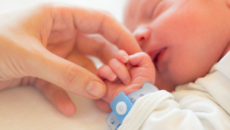The few hours or days the birth parents and adoptive parents spend together at the hospital are intense for everyone involved. The birth parents are saying hello to the baby, and, at the same time, are preparing to say goodbye. The adoptive parents are joyful but anxious. They may worry about how they’ll be treated by the hospital staff, or that the birth mother will change her mind about adoption and delay their dreams of parenthood.
It helps to discuss the hospital adoption experience with the birth parents and an adoption professional ahead of time, giving both families the opportunity to weigh in. Decide on as many details as possible, such as who will hold the baby first in the delivery room and what name the birth mother will put on the birth certificate form, and record them in a written hospital plan.
If these topics aren’t talked about in advance, there can be hurt feelings on both sides at a very emotional time. The discussion you have will not eliminate all of the problems and stress at the hospital, but it will reduce the number of potential stumbling blocks. Here are more tips on making the most of the time you’ll spend together following your child’s birth:
- Advocate for the birth mother. If the nursing staff is giving her a hard time, speak up on her behalf. One birth mother I know described how much the adoptive mom’s support in the hospital meant to her: “It helped me realize that she cares about me, not just my baby.”
- Be sensitive to the birth mother’s needs, and let her feel she is in control. It helps if you can view this as her hospital experience. Check in with her and ask how things are going. At the same time, offer her time alone with the baby while you take a break (go back to the hotel and take a nap, or shop for baby items). Some birth mothers have complained that the adopting couple was always in the room, and they never had any time alone with the baby. You will have plenty of time with the baby when you get home!
- Bring a gift. A special token will show you are thinking about the birth mother. You might bring flowers or an album, with a couple of photos from the hospital already in it. Point out to her that there is plenty of space for the pictures you will send her in the coming months.
- Keep an open mind. Remember that, in the hospital, the baby is still the birth mother’s, not yours! Be as flexible as possible, and take cues from her on how she wants to proceed. It’s OK if the hospital plan goes out the window once the baby has arrived. For example, the birth mother might have said in advance that she didn’t want to spend time alone with the baby in the hospital. Suddenly she is rooming in with him. Does this mean she is changing her mind about the adoption? Probably not. She has simply changed her mind about wanting time with the baby.
- Be prepared to witness the birth mother’s mixed feelings and pain. Placing a child for adoption is a difficult decision. Don’t ask her for reassurance that she isn’t changing her mind. Instead, encourage her to talk to her counselor about her feelings and decisions.
- Don’t involve friends and family. One problem I often see is that of the adoptive parents inviting friends and relatives to come to the hospital. Although you want everyone to see the baby, remember that this is the birth mother’s time with the baby. If she places him for adoption, this is the only time she will get to be the mom. The birth mother also needs to see you falling in love with the baby at the hospital. This is best done without the intrusion of friends and family members.
Saying Goodbye
The hardest part of the hospital experience is the discharge. This is the time when the reality of the adoption decision hits the birth mother. She has had the baby with her for nine months, and now she is leaving the hospital empty-handed. Be sensitive to her emotions. At the same time, you might find yourself struggling to balance your joy with her pain. Many families have told me they were surprised to feel guilty at the discharge time, knowing that their happiness came at the expense of the birth mother. (Guilty feelings might also initially affect your bonding with the baby.)
Keep in mind that the birth mother’s sadness is a normal part of grief. She wants you to be happy — and your joy will ease her pain. It will be important for her to hear from you in the coming months, to know how happy you are and how the baby is doing. Don’t be afraid to send photos of a beautiful, happy, smiling baby. That is what she wants to see!


